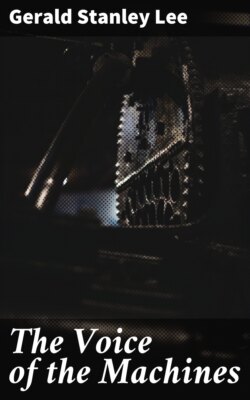Читать книгу The Voice of the Machines - Gerald Stanley Lee - Страница 8
На сайте Литреса книга снята с продажи.
POETS
ОглавлениеTable of Contents
When, standing in the midst of the huge machine-shop of our modern life, we are informed by the Professor of Poetics that machinery—the thing we do our living with—is inevitably connected with ideas practical and utilitarian—at best intellectual—that “it will always be practically impossible to make poetry out of it, to make it appeal to the imagination,” we refer the question to the real world, to the real spirit we know exists in the real world.
Expectancy is the creed of the twentieth century.
Expectancy, which was the property of poets in the centuries that are now gone by, is the property to-day of all who are born upon the earth.
The man who is not able to draw a distinction between the works of John Milton and the plays of Shakespeare, but who expects something of the age he lives in, comes nearer to being a true poet than any writer of verses can ever expect to be who does not expect anything of this same age he lives in—not even verses. Expectancy is the practice of poetry. It is poetry caught in the act. Though the whole world be lifting its voice, and saying in the same breath that poetry is dead, this same world is living in the presence of more poetry, and more kinds of poetry, than men have known on the earth before, even in the daring of their dreams.
Pessimism has always been either literary—the result of not being in the real world enough—or genuine and provincial—the result of not being in enough of the real world.
If we look about in this present day for a suitable and worthy expectancy to make an age out of, or even a poem out of, where shall we look for it? In the literary definition? the historical argument? the minor poet?
The poet of the new movement shall not be discovered talking with the doctors, or defining art in the schools, nor shall he be seen at first by peerers in books. The passer-by shall see him, perhaps, through the door of a foundry at night, a lurid figure there, bent with labor, and humbled with labor, but with the fire from the heart of the earth playing upon his face. His hands—innocent of the ink of poets, of the mere outsides of things—shall be beautiful with the grasp of the thing called life—with the grim, silent, patient creating of life. He shall be seen living with retorts around him, loomed over by machines—shadowed by weariness—to the men about him half comrade, half monk—going in and out among them silently, with some secret glory in his heart.
If literary men—so called—knew the men who live with machines, who are putting their lives into them—inventors, engineers and brakemen—as well as they know Shakespeare and Milton and the Club, there would be no difficulty about finding a great meaning—i.e., a great hope or great poetry—in machinery. The real problem that stands in the way of poetry in machinery is not literary, nor æsthetic. It is sociological. It is in getting people to notice that an engineer is a gentleman and a poet.
V
